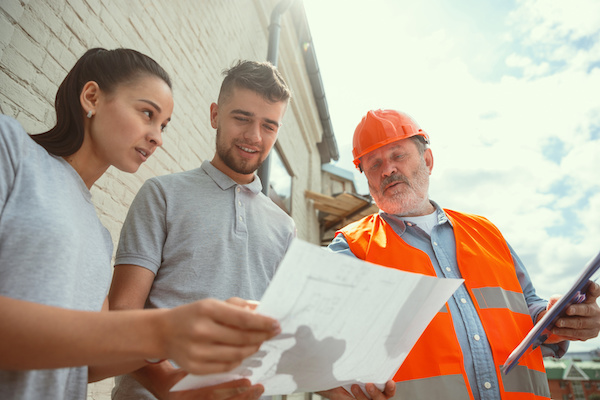How to find a good builder
A good builder is key to the success of any building project, so here’s our guide to finding one - and what questions to ask them

Choosing a builder is one of the most important decisions you’ll make about your building project. You need someone who provides a good quality service and is reliable.
First, you need to be able to give your builder a full brief for the work you want them to do. This should include your aims, budget, design style and expectations, and they’ll also need to know which local authority planning department you fall under.
Finding the right builder to deliver your brief will then take some time. The majority of builders are reputable and reliable but it’s always good to do some background research, so you make an informed decision.
Then, once you’ve found the right builder, they probably won’t be able to start straight away. Most good builders will already have jobs lined up months in advance!
Recommendations - and what to ask people who recommend a builder
Probably the best way to find a good builder is by recommendation from a family member, friend or neighbour. A good builder will often get most of their work via recommendations from satisfied customers.
Your local estate agent may also be able to recommend someone good, as builders are always looking for properties to renovate. Other tradespeople are also a useful source of advice - for example, if you know a good electrician or plumber, ask them which builders they recommend and work with. (You can also ask good builders to recommend electricians and plumbers.)
Ask whoever makes a recommendation the following questions:
• Is this builder’s work of a high standard?
• Is this builder reliable and easy to get on with?
• How does the builder respond if something unexpected happens or goes wrong on a project?
See below for questions you can put to the builders themselves.
Trade directories and trade associations
Various online trade directories and trade association websites may offer details of a wide choice of builders. You’ll need to narrow that down to the best options for your project. Check the individual builders’ websites (if they have one) for further details, and ask any potential builder to answer the questions below.
• The Federation of Master Builders (FMB) is perhaps the best-known trade association in the industry, its members are expected to uphold certain standards and follow a code of conduct.
• The National Federation of Builders (NFB) also has a code of conduct. All its members are covered by public liability insurance and there is a formal complaints procedure if you’re not happy with the work carried out.
You should however be aware that just because a builder is a member of one of these associations it is not a guarantee of the standard of their work.
Questions to ask any potential builder
We suggest getting written quotes from at least three different builders before choosing who to hire for your project. It might help to ask them the following questions:
1. When could you start?
A good builder will usually (but not always) have lots of work on already, so be wary if they can start straight away.
2. How many jobs have you got on at the moment?
At the same time, you don’t want your builder to be so busy with other work that they can’t devote their attention to your project.
3. How long have you been in business?
Experience is very important in any building project. You can also find out more about the business, which should always have a fixed, permanent address (a premises or office, or even the home address where the builder is registered). The builder might also be able to provide you with references from trade bodies, or other information as evidence of their experience and reliability.
4. What experience do you have of working on projects like mine?
Again, experience counts. A good builder may let you speak to previous customers who have had similar building work done so that you can hear - and even see - how things went.
5. Do you provide written quotes and contracts?
This should be broken down to show all aspects of the job: materials, labour, working hours, timeframes and completion date, responsibilities including all subcontracting, how rubbish will be disposed of, etc. Make sure VAT is included in prices.
For bigger projects, we recommend having a written contract with your builder to agree what is being done and how much it will cost. This will help if there are any misunderstandings or disputes later on.
6. How would you want to be paid?
Especially on larger building projects, builders may need some payment up front. It might help to have a schedule of payments agreed in writing before work starts.
Only pay the final amount when you are satisfied that the work has been completed to a satisfactory standard and you’ve received your completion certificate from building control.
Be wary of builders who:
• Can start work immediately (though a good builder may be free if a project has been cancelled)
• Offer only verbal quotes and agreements about the work to be done
• Want to be paid in cash to avoid paying tax
• Want to be paid the full amount up front.
For more information about common building projects please click here
Contact your local authority building control team here
